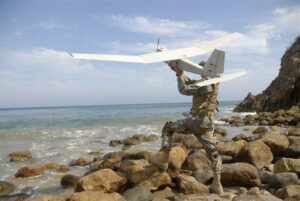A team from the Navy and Marine Corps Small Tactical UAS program office (PMA-263) launched the Training and Logistics Support Activity (TALSA) in mid-July to Marines from II Marine Expeditionary Force. The activity allows troops to receive UAS training on short notice and expand the previous curriculum to include all Group I UAS assets.
Group I UAS assets weigh less than 20 pounds; typically fly at altitudes below 1,200 feet; and fly between 45 minutes to approximately two hours. They include: RQ-11B Raven, Wasp, RQ-20A Puma and RQ-16B T-Hawk UAS.
“Consistent training and sustainment support are key components for any weapon system and are integral to the warfighter’s mission success,” said Col. Jim Rector, PMA-263 program manager. “After years of operational contingency funding and rapid fielding of numerous small UAS, we identified this as an area that we needed to rapidly improve.”
Rector said small UAVs provide the battlefield commander an organic capability, within his or her unit, to perform over-the-horizon reconnaissance, surveillance and target acquisition. This reduces operational risks and enhances his or her decision process.
Historically, the Marines used other contracts to support their UAS training requirements for the RQ-11B Raven. The newly established TALSA offers classes more frequently with an expanded curriculum, giving Sailors and Marines greater flexibility when going on rapid deployment. Additionally, PMA-263 recruited directly from the Wounded Warrior Project to staff the support activity, giving former service men and women an opportunity to continue their service in a new capacity.
The courses focus on the systems’ function, employment, maintenance and troubleshooting issues. Once trained, UAS operators can tactically and effectively employ Group 1 systems to include mission planning, mission sensor/payload operations, launching, remotely piloting and recovering the aerial vehicle.
PMA-263 plans to establish an additional TALSA at Camp Pendleton, Calif. later this year.
“Our job at PMA-263 is to ensure we provide and support the products that “find & fix” our nation’s adversaries and threats,” Rector said. “This allows our Sailors and Marines to do what they do best, and that is to “finish” those threats.”



















